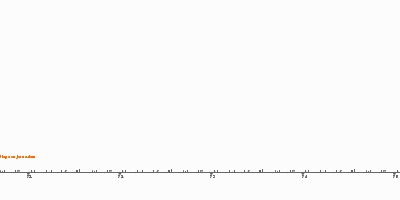Daniel 11:40-45 (1 gen 164 anni a. C. – 31 dic 164 anni a. C.)
Descrizione:
Dan 11:40 And at the time of the end shall the king of the south push at him: and the king of the north shall come against him like a whirlwind, with chariots, and with horsemen, and with many ships; and he shall enter into the countries, and shall overflow and pass over.Dan 11:41 He shall enter also into the glorious land, and many countries shall be overthrown: but these shall escape out of his hand, even Edom, and Moab, and the chief of the children of Ammon.
Dan 11:42 He shall stretch forth his hand also upon the countries: and the land of Egypt shall not escape.
Dan 11:43 But he shall have power over the treasures of gold and of silver, and over all the precious things of Egypt: and the Libyans and the Ethiopians shall be at his steps.
Dan 11:44 But tidings out of the east and out of the north shall trouble him: therefore he shall go forth with great fury to destroy, and utterly to make away many.
Dan 11:45 And he shall plant the tabernacles of his palace between the seas in the glorious holy mountain; yet he shall come to his end, and none shall help him.
Verse 40: "The king of the south shall attack him":
The king of the south refers to Ptolemy VIII of Egypt, who had once been an ally of Antiochus IV but had turned against him. The king of the north refers to Antiochus IV Epiphanes himself.
The attack from the south (Egypt) marks the renewed conflict between the Seleucid Empire and Egypt. Antiochus IV had already been involved in wars against Egypt during his reign, but this time the Ptolemaic king moves to challenge Antiochus.
“He shall rush upon him like a whirlwind":
Antiochus, as the king of the north, retaliates swiftly with his military forces. Chariots, horsemen, and ships are all part of his campaign as he invades Egypt once more.
Antiochus had already established his control over Phoenicia and parts of Syria, so his power was significant, but his direct conflict with Egypt escalated.
Verse 41: "He shall come into the glorious land...":
The “glorious land” refers to Israel or Judea, as this region was often described in biblical prophecies as a key location of contention.
Antiochus IV’s armies passed through Judea in his campaigns. There was significant bloodshed and turmoil, especially with the desecration of the Jewish Temple in 167 BCE, which was the catalyst for the Maccabean Revolt.
Interestingly, Edom, Moab, and Ammon (regions to the southeast of Israel) are specifically mentioned as escaping Antiochus’s conquest. These areas were located south and east of Israel, and their escape from Antiochus’s grasp is notable because it highlights the limited control he had over this part of the world, despite his overall dominance.
Verse 42-43: "He shall stretch out his hand against the countries...":
Antiochus IV successfully conquered Egypt during this period, plundering the treasures of Egypt, including its wealth, gold, silver, and other precious goods. His control over Egypt, along with its Libyan and Cushite (Ethiopian) territories, was a significant victory.
Antiochus’s ambitions seemed unstoppable at this point, as he ruthlessly annexed Egypt, gaining even more power and wealth.
Verse 44: "But news from the east and the north shall alarm him...":
The “news from the east and north” refers to the growing threat from the Parthians (or possibly the Persians) in the east.
Parthia, in particular, was a rising power that had already been challenging the Seleucid Empire in the east. The Parthians were a formidable empire that soon became a major rival to the Seleucid dynasty.
Antiochus IV was forced to turn his attention to the east as this new threat loomed large. His military campaign had to shift focus due to the Parthian rise, which would have alarmed Antiochus and the Seleucid forces.
Verse 45: "He shall pitch his palatial tents between the sea and the glorious holy mountain...":
Black Sea, Caspian Sea and the Holy Mountain so we can triangulate this area
"Yet he shall come to his end":
Antiochus IV died in Persia, possibly while campaigning against the Parthians. Historical accounts suggest that he died in Iran (near Ecbatana), and the cause of his death is often attributed to illness, though some accounts suggest he was struck down by divine judgment as a result of his arrogance and oppression of the Jews.
His death marked the end of his reign and the collapse of his grand ambitions. His empire began to fragment, and his successors struggled to maintain control.
Aggiunto al nastro di tempo:
Data:
1 gen 164 anni a. C.
31 dic 164 anni a. C.
~ 12 months
